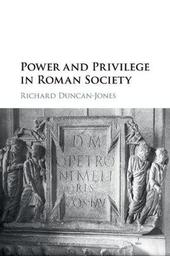
|
Power and Privilege in Roman Society
Paperback / softback
Main Details
| Title |
Power and Privilege in Roman Society
|
| Authors and Contributors |
By (author) Richard Duncan-Jones
|
| Physical Properties |
| Format:Paperback / softback | | Pages:241 | | Dimensions(mm): Height 230,Width 150 |
|
| Category/Genre | Economic history |
|---|
| ISBN/Barcode |
9781316604335
|
| Classifications | Dewey:303.30937 |
|---|
| Audience | | Professional & Vocational | |
|---|
| Illustrations |
17 Line drawings, black and white
|
|
Publishing Details |
| Publisher |
Cambridge University Press
|
| Imprint |
Cambridge University Press
|
| Publication Date |
15 March 2018 |
| Publication Country |
United Kingdom
|
Description
How far were appointments in the Roman Empire based on merit? Did experience matter? What difference did social rank make? This innovative study of the Principate examines the career outcomes of senators and knights by social category. Contrasting patterns emerge from a new database of senatorial careers. Although the highest appointments could reflect experience, a clear preference for the more aristocratic senators is also seen. Bias is visible even in the major army commands and in the most senior civilian posts nominally filled by ballot. In equestrian appointments, successes by the less experienced again suggest the power of social advantage. Senatorial recruitment gradually opened up to include many provincials but Italians still kept their hold on the higher social groupings. The book also considers the senatorial career more widely, while a final section examines slave careers and the phenomenon of voluntary slavery.
Author Biography
Richard Duncan-Jones is a Fellow of Gonville and Caius College, Cambridge, and has also been a Member of the Institute for Advanced Study, Princeton. He has published widely on Roman social and economic history. His previous books published by Cambridge University Press are The Economy of the Roman Empire, 2nd edition (1982), Structure and Scale in the Roman Economy (1990) and Money and Government in the Roman Empire (1994). He has been a Fellow of the British Academy since 1992.
|